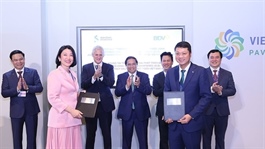Vietnam primed for GMT adoption
Vietnam primed for GMT adoption
With a long-awaited resolution adopted by the legislature, Vietnam now has a legal framework for applying top-up corporate income tax under a new international system.

The National Assembly (NA) last week passed a resolution on the imposition of top-up corporate income tax (CIT) of 15 per cent under the Global Anti-Base Erosion (GloBE) model rules, which will take effect on January 1 next year until the country’s new law on CIT is released, covering the contents of top-up CIT under GloBE model rules.
Under the resolution’s Article 2 on taxpayers, the taxpayers in Vietnam include a member company of a multinational corporation (MNC) with a turnover equivalent to €750 million ($821 million) or more in the consolidated financial statements of the ultimate parent company for at least two of the four years immediately preceding the fiscal year.
However, some entities are free from the tax, including government and international organisations, non-profits, pension funds, investment fund parent companies; real estate investment parent companies; and organisations with at least 85 per cent of asset value owned directly or indirectly through the aforementioned organisations.
In December 2021, the Organisation for Economic Co-operation and Development published the GloBE model rules, which aim to impose a global minimum tax (GMT) of 15 per cent on MNCs with a revenue in excess of €750 million ($821.62 million) from 2024. In doing so, the effective tax rate has to be calculated in the jurisdiction where an MNC has a taxable presence.
The starting point for calculating the effective tax rate is the financial accounting net income of an entity, with certain amendments. For the purposes of calculating the effective tax rate, the income tax reported in the financial statements, including the movements in the deferred tax position, is relevant.
For Vietnam, the imposition of the GMT will help ensure the country’s right to levy the tax, in line with the international practices and trend currently deployed by so many nations.
“It will also be suitable to the Party’s direction and policy on improving the state budget and international integration,” said the National Assembly Finance and Budget Committee. “In addition, it will also clearly demonstrate the transparency of Vietnam’s investment climate and meet requirements of some major foreign investors operating and wishing to pay the top-up CIT in Vietnam, as from the tax-calculating period of 2024.”
The implementation of this GMT has earned consensus in participation of over 100 nations. Many countries have legislated these GloBE model rules to apply to the tax-calculating period of 2024, the committee said.
According to the committee, if Vietnam fails to legislate regulations on GMT, investment-exporting countries will be able to collect top-up CIT of 15 per cent from MNCs that have projects in Vietnam and are paying an actual CIT rate of below 15 per cent.
“Therefore, to maintain Vietnam’s taxing rights in the context that countries exporting investment in Vietnam will implement the GMT from the 2024 tax-calculating period, it is necessary for Vietnam to promulgate a legal document in order to lay a legal foundation for foreign-invested enterprises (FIEs) subject to the GMT to be able to declare and pay top-up CIT in Vietnam instead letting them pay this sum of tax in their mother nations,” the committee said.
“Furthermore, the early enactment of this resolution manifests Vietnam’s determination in implementing the GMT from January 1, 2024, strengthening investors’ confidence in the country’s legal environment.”
According to a government report on assessing the impact of the resolution, based on 2022 CIT data analysis, it calculated that over 120 FIEs will be subject to the resolution, with a total amount of top-up CIT of about $616 million.
Regarding domestic businesses, the government report estimates that six businesses will be subject to the resolution, with an estimated amount of income inclusion rule of around $3 million that can be collected from their overseas investments - in cases where the investment-receiving countries do not apply the GMT.




























